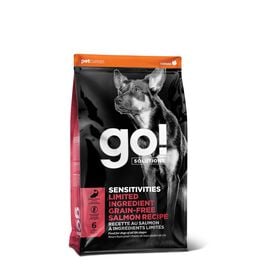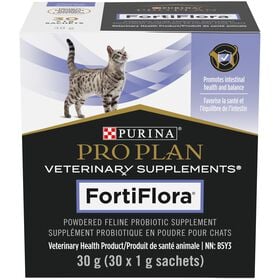Does your cat compulsively lick itself? Does your dog scratch frantically? Did you know that animals are just as susceptible to allergies as we are? In fact, it's a fairly common problem among pets. But don't be put off - there are ways to relieve your cat's or dog's symptoms!

What are allergies?
An allergy is an inappropriate and excessive reaction of the immune system to a normally harmless substance, such as pollen, dust mites, food or chemicals. When in contact with the allergen, the body reacts by releasing chemicals such as histamine, causing a variety of symptoms.
Symptoms of allergies in cats and dogs
- Redness of the skin: patches, spots, or scabs
- Swelling around the edge of the eyes and on the paws (between the digits)
- Itchy skin
- Excessive licking and biting
- Skin discolouration caused by licking
- Poor quality coat and weight loss
- Coughing, sneezing or wheezing
- Recurring ear infections: scratching, shaking the head or an unpleasant odour indicating pain in the ears
- Unpleasant odour overall
Types of allergy
Allergic reactions can have various causes.
Food allergies
If you notice your pet exhibiting one or more symptoms in the weeks following a change of diet or the introduction of a new treat, you may suspect the presence of a food allergy. Beef, wheat, dairy products, gluten, chicken, potatoes, corn or soy are all potential allergens.
What's the difference between a food allergy and a food intolerance? An allergy provokes an immune system reaction, whereas an intolerance only generates a digestive system reaction (flatulence, diarrhea, vomiting).
Also read: What to do when your cat or dog has diarrhea
Environmental allergies (atopy)
These include seasonal allergies, which occur from May to October, when pollens are released into the environment. If your pet reacts to birch pollen, he'll be itchy in spring, while if he suffers from ragweed allergies, the autumn months will be more difficult. Avoid letting him out when the pollen count is very high.
Some pets have allergy symptoms all year round. In such cases, you need to look elsewhere in the environment to identify the source of these reactions. These can occur when allergens (e.g. dust mites, dust, certain perfumed products) enter the respiratory tract or penetrate the skin and cross the skin barrier. The better the condition of the skin barrier, the more effective it will be in countering allergens.

Getting a diagnosis
Consult your veterinarian to start quick treatment. Before jumping to the conclusion that it is an atopy, your vet will ask you a number of questions in order to properly understand what’s happening. They’ll also perform some diagnostic tests, and a global treatment may be initiated.
Antibiotics and antifungals are often prescribed at this stage. This is because when the skin is disturbed, bacteria and yeast multiply and contribute to itching. It's a never-ending cycle! An anti-parasite treatment may also be recommended to ensure that Doggy and Kitty's problems aren't caused by fleas or other parasites.
If symptoms persist or occur in a cyclical pattern, allergies are most likely the culprit. A hypoallergenic diet or a restrictive elimination diet will be recommended, since food allergy is the first thing to rule out... and the easiest to manage! It will be important to feed the new food exclusively during the test period. If you still wish to give your pet treats, make sure you choose treats that contain the same protein as the one being tested.
If the new diet doesn't change your dog's or cat's condition, an environmental or seasonal allergy will be considered. An animal can also have more than one allergy at the same time. That's when the headache begins!
Also read: Parasites in your home? Salvage what you can!
Treatments for allergies in cats and dogs
It's hard to watch your little puppy or kitty suffer the discomforts of allergies, isn't it? Luckily, there are ways to help your pet.
First of all, you need to find out which allergen is causing your pet to react, since the best way to relieve its symptoms is to prevent exposure to the allergen responsible for the problem.
Medication is also available to alleviate troublesome symptoms. They tend to be cortisone- or antihistamine-based, or use other molecules that help diminish the immune system’s response to allergies. However, you'll need to ensure that your pet takes these medications at the minimum effective dose, as some can be harmful at high doses over the long term. Your veterinarian will advise you on the best course of action.
Immunotherapy vaccines are also an excellent option. Veterinarians specialized in dermatology are trained to manage complex cases.
A little extra care goes a long way
Choose a high-quality diet. For example, the Go! Solutions brand offers the Sensitivities product line, whose recipes contain just one animal protein and a minimum of additional ingredients to minimize your pet's exposure to foods to which they may be sensitive. They are also rich in omega-3 fatty acids to support brain development, a shiny coat and healthy skin that will also resist allergens.
Shampoos, sprays and conditioners can also greatly assist in eliminating contact between the allergens and the coat by creating a protective layer over the skin.
And finally, acupuncture can help reduce symptoms of allergies in cats and dogs.

Did you know?
- Your pet's immune system continues to develop until the age of three. It’s during these years that allergies tend to appear, so you should wait until their third birthday before giving them an allergy test — just to be sure.
- Allergies are genetic and hereditary. Dogs are more commonly affected, and certain breeds, such as boxers, bulldogs, labradors and golden retrievers, to name a few, are at higher risk.
- Allergy to flea saliva is the most common allergy in cats.
- Immunotherapy vaccines are effective in 70-75% of cases, and is not very costly. It's an option worth considering!
Our pets are not immune to the plague of allergies. Don't wait for the situation to get out of hand - it'll only make treatment longer and more painful for your pet, your wallet and you!
This article was reviewed by Dr. Valérie Trudel, veterinarian and member of CABEA Mondou.








